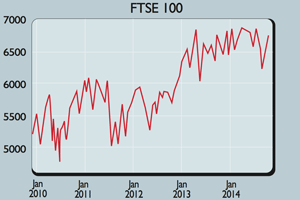
Britain “has been the wrong place to invest this year”, says Bryce Elder in the Financial Times. Last week, the FTSE 100 was ranked 19th in a table of the world’s 20 biggest stockmarkets’ year-to-date performances.
It has declined marginally since early January. The British blue-chip stocks index was also conspicuously slow to make up lost ground after October’s wobble.
The index “is always going to struggle” when there is bad news for commodities, says Trustnet Direct’s Tony Cross. Oil and mining companies make up 25% of the index, compared to an average of 6% in other developed markets.
China has just reported its biggest decline in imports for eight months, implying lower demand for raw materials. A resilient pound, meanwhile, has undermined earnings expectations, as 77% of FTSE 100 sales are made overseas – although that may change rapidly as the US dollar strengthens.
The political backdrop, moreover, has become unusually uncertain. As the May 2015 general election approaches, investors may become “increasingly exercised about the wide range of…outcomes”, says Fidelity’s Tom Stevenson in The Sunday Telegraph.
A recent poll suggested that no two parties could form a majority under the likely tally of seats. A messy three-party coalition and another election shortly afterwards are both distinct possibilities.
There could well be a referendum on EU membership in 2017, and the uncertainty over a possible exit “would have an immense impact on markets”, says Lex in the FT. “Think of companies for whom mobility of capital and labour are important.” Manufacturers may decide to build new plants outside Britain. Big global banks could well move.
Income investors also have reason to worry. The FTSE 100 offers an attractive-looking yield. But oil firms’ payouts, worth 15% of total dividends, could be under threat at a time when underlying dividend growth for the index as a whole is at a four-year low.
On the plus side, sterling has weakened recently, which looks set to continue as British and US monetary policy diverges. Meanwhile easy money is still pushing stocks higher, and any European quantitative easing would no doubt be felt here too.
But it wouldn’t be much of a surprise if the index as a whole continues to lag next year. We look at some of the best individual stocks in this week’s cover story.